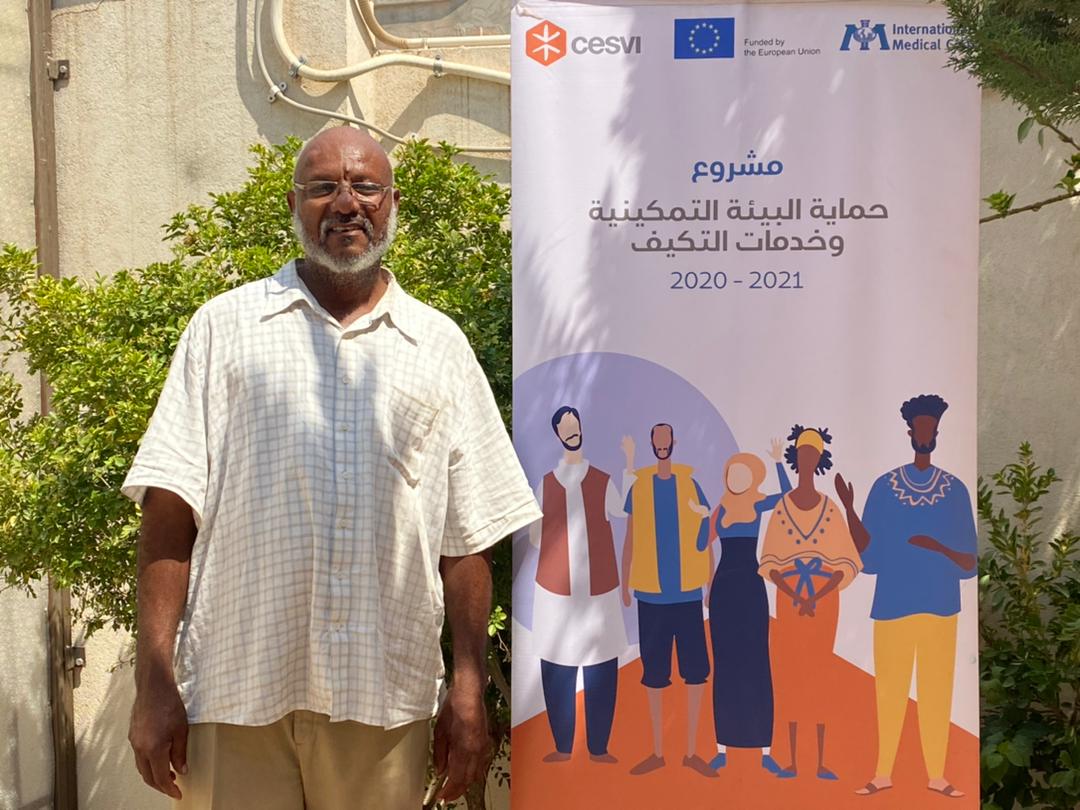“Wallah (I swear to God), I am grateful. For nine months we hadn’t paid rent and we were afraid had Cesvi not supported us with our rent, the landlord would have thrown us out”.
Father of four, Osman – a 57-year-old Sudanese ceramic worker – sits in Cesvi’s office in Misrata and speaks with our psychologist to share his story. Osman has a large family: together with his wife and four kids, another female relative of his with her daughter also lives with them. Before receiving support from Cesvi, he “had reached out to other friends and family but it wasn’t enough, things were getting desperate”.
Osman has been living in Libya for fifteen years. He is a symbol of the complex migration landscape of Libya, where most migrants – even those who had settled in Libya long before the revolution – were and still are daily wage earners. “There are others in a situation similar to ours, you know, construction workers and so on. Anyone who is a daily wage earner is affected. I was having problems with both my eyes but if you don’t work, you don’t eat”. His voice trails off. Eventually, he had to stop working.
Like Osman, Tarek is also receiving support after having reached out to Cesvi through the hotline. The 43-year-old Moroccan man – father of four children – arrived decades ago with his parents as a child when they settled in the country. Tarek got in touch with Cesvi when he found himself struggling to provide for his family. At the time, he was also experiencing severe mental health issues after tragically losing his wife in 2020. She was on her way home in a taxi when she got into an accident. Though admitted immediately to the intensive care unit, she didn’t make it and sadly passed away. Now Tarek was alone with four young children under his care. The magnitude of this responsibility left him completely desperate.
With few to no opportunities for work, coping capacities are being stretched to a maximum, as Osman and Tarek attest. For vulnerable populations, the risks are exacerbated. Despite a ceasefire and the ongoing peace process, Libya continues to witness multifaceted humanitarian issues and to date, 1.3 million people require humanitarian assistance for the most fundamental needs. Prolonged instability, combined with lack of income and increased needs due to COVID-19, all contribute to the destabilisation of an already extremely fragile country. Widespread impact on physical and mental wellbeing on families and individuals such as Tarek and Osman are prevalent. A multifaceted approach to address the most vulnerable – including internally displaced persons (IDPs), migrants and refugees – is needed. Therefore, coordination is at the heart of addressing these complex needs. To facilitate and coordinate efforts effectively, Cesvi – in consortium with International Medical Corps (IMC) – runs the PEERS: Protection Enabling Environment and Resilience Services project, funded by the EU Trust Fund for Africa (#EUTF4Africa), implementing activities in Tripoli and Misrata.
For Osman, Cesvi and IMC’s referral system alleviated some of the burden of searching for specialised care, as he suffered from several health issues, “I was not only struggling with my eyesight but suffering severely with back issues, so Cesvi referred me to IMC where I received new medication”. Thanks to Cesvi and IMC, those like Osman can seek assistance for a wide range of protection risks including psychological counselling, obtaining medication as well as more specialised services such as psychiatry. IMC is still one of the few international organizations that have supported vulnerable populations in Libya by providing emergency medical services, training for local health workers, and delivery of essential medicines and supplies.
Lack of resources or access to basic services such as healthcare and food increases reliance on the use of negative coping strategies. For some families, like Tarek’s, this meant he had to withdraw his children from school, to cover the cost of food and shelter. For Tarek, connecting with Cesvi gave them the chance to receive necessary items as well as the opportunity to register one of his children in the Cesvi-run Baity Centre, a structure that provides non-formal education to out of school children – both in-person and remotely due to COVID-19 – as well as remedial classes for children in need and at risk of drop-out. “We were provided clothing and non-food items (NFIs) and my child was enrolled in education programmes.” Initially, he was seen by a psychologist of Cesvi, who then identified the need to refer Tarek to IMC for more specialised psychological services. “Cesvi and IMC helped me with several things, my physical and mental health improved, I mean I was feeling very sick”. The IMC psychiatrist supported him to deal with the loss of his wife and provided methods and tools to better manage his life. IMC and Cesvi operate by establishing strong referral pathways to offer services effectively and cohesively thereby ensuring that individuals-in-need receive urgent care.
“There was a positive impact on us because of the help we received, my family is very happy to receive this support, the situation before was so bad. Our mental health has improved a lot. I want things to get better. Now with my ability to work, I can provide things that make the family happy.”
The precarious context exacerbates the risks experienced by individuals such as Tarek and Osman. Coordinated assistance by international actors such as Cesvi and IMC delivers immediate remedial relief for them. For Tarek and Osman, the services provide a lifeline:
“Thank God, things are improving, my children are happier. I am grateful. Our life is changing, our mental and physical health is better. I hope that our situation continues to improve.”
(*) The names of both beneficiaries have been changed for protection purposes.
